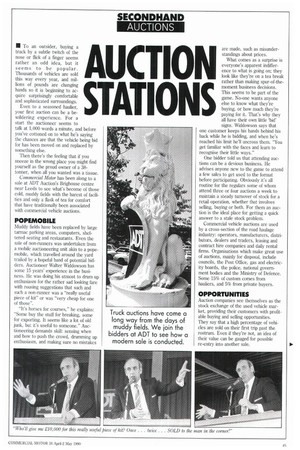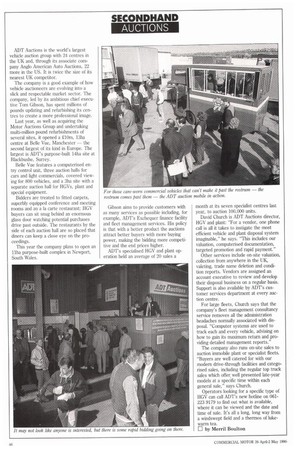AUCTION STATIONS
Page 71

Page 72

If you've noticed an error in this article please click here to report it so we can fix it.
• To an outsider, buying a truck by a subtle twitch of the nose or flick of a finger seems rather an odd idea, but it seems to be popular. Thousands of vehicles are sold this way every year, and millions of pounds are changing hands so it is beginning to acquire surprisingly comfortable and sophisticated surroundings.
Even to a seasoned haulier, your first auction can be a bewildering experience. For a start the auctioneer seems to talk at 1,000 words a minute, and before you've cottoned on to what he's saying the chances are that the vehicle being bid for has been moved on and replaced by something else.
Then there's the feeling that if you sneeze in the wrong place you might find yourself as the proud owner of a 38tonner, when all you wanted was a tissue.
Commercial Motor has been along to a sale at ADT Auction's Brighouse centre near Leeds to see what's become of those cold, muddy fields with the barest of facilities and only a flask of tea for comfort that have traditionally been associated with commercial vehicle auctions.
POPEMOBILE
Muddy fields have been replaced by large tarmac parking areas, computers, sheltered seating and restaurants. Even the sale of non-runners was undertaken from a mobile auctioneering unit akin to a popemobile, which travelled around the yard trailed by a hopeful band of potential bidders. Auctioneer Walter Widdowson has some 15 years' experience in the business. He was doing his utmost to drum up enthusiasm for the rather sad looking fare with rousing suggestions that such and such a non-runner was a "really useful piece of kit" or was "very cheap for one of those".
"It's horses for courses," he explains: "Some buy the stuff for breaking, some for exporting. It seems like a lot of old junk, but it's useful to someone." Auttioneering demands skill: sensing when and how to push the crowd, drumming up enthusiasm, and making sure no mistakes are made, such as misunderstandings about prices.
What comes as a surprise is everyone's apparent indifference to what is going on; they look like they're on a tea break rather than making spur-of-themoment business decisions. This seems to be part of the game. No-one wants anyone else to know what they're buying, or how much they're paying for it. That's why they all have their own little 'bid' signs. Widdowson says that one customer keeps his hands behind his back while he is bidding, and when he's reached his limit he'll uncross them. "You get familiar with the faces and learn to recognise their little ways."
One bidder told us that attending auctions can be a devious business. He advises anyone new to the game to attend a few sales to get used to the format before participating. Obviously it's all routine for the regulars some of whom attend three or four auctions a week to maintain a steady turnover of stock for a retail operation, whether that involves selling, buying or both. For them an auction is the ideal place for getting a quick answer to a stale stock problem.
Commercial vehicle auctions are used by a cross-section of the road haulage industry: operators, manufacturers, distributors, dealers and traders, leasing and contract hire companies and daily rental firms. Organisations which make great use of auctions, mainly for disposal, include councils, the Post Office, gas and electricity boards, the police, national government bodies and the Ministry of Defence. Some 15% of custom comes from hauliers, and 5% from private buyers.
OPPORTUNITIES
Auction companies see themselves as the stock exchange of the used vehicle market, providing their customers with profitable buying and selling opportunities. They say that a high percentage of vehicles are sold on their first trip past the rostrum. Even if they're not, an idea of their value can be gauged for possible re-entry into another sale. ADT Auctions is the world's largest vehicle auction group with 24 centres in the UK and, through its associate company Anglo American Auto Auctions, 22 more in the US. It is twice the size of its nearest UK competitor.
The company is a good example of how vehicle auctioneers are evolving into a slick and respectable market sector. The company, led by its ambitious chief executive Tom Gibson, has spent millions of pounds updating and refurbishing its centres to create a more professional image.
Last year, as well as acquiring the Motor Auctions Group and undertaking multi-million pound refurbishments of several sites, it opened a 210m, 13ha centre at Belle Vue, Manchester — the second largest of its kind in Europe. The largest is ADT's purpose-built 14ha site at Blackbushe, Surrey.
Belle Vue features a computerised entry control unit, three auction halls for cars and light commercials, covered viewing for 800 vehicles, and a 3ha site with a separate auction hall for HGVs, plant and special equipment.
Bidders are treated to fitted carpets, superbly equipped conference and meeting rooms and an a la carte restaurant; HGV buyers can sit snug behind an enormous glass door watching potential purchases drive past outside. The restaurants by the side of each auction hall are so placed that diners can keep a close eye on the proceedings.
This year the company plans to open an llha purpose-built complex in Newport, South Wales. Gibson aims to provide customers with as many services as possible including, for example, ADT's Exchequer finance facility and fleet management services. His policy is that with a better product the auctions attract better buyers with more buying power, making the bidding more competitive and the end prices higher.
ADTs specialised HGV and plant operation held an average of 20 sales a month at its seven specialist centres last year, to auction 100,000 units.
David Church is ADT Auctions director, HGV and plant: "For a vendor, one phone call is all it takes to instigate the most efficient vehicle and plant disposal system imaginable," he says. "This includes our valuation, computerised documentation, targeted promotion and rapid payment."
Other services include on-site valuation, collection from anywhere in the UK, valeting, trade name deletion and condition reports. Vendors are assigned an account executive to review and develop their disposal business on a regular basis. Support is also available by ADT's customer services department at every auction centre.
For large fleets, Church says that the company's fleet management consultancy service removes all the administration headaches normally associated with disposal. "Computer systems are used to track each and every vehicle, advising on how to gain its maximum return and providing detailed management reports."
The company also runs on-site sales to auction immobile plant or specialist fleets. "Buyers are well catered for with our modern drive-through facilities and categorised sales, including the regular top truck sales which offer. well presented late-year models at a specific time within each general sale," says Church.
Operators looking for a specific type of HGV can call ADT's new hotline on 061223 9179 to find out what is available, where it can be viewed and the date and time of sale. It's all a long, long way from a windswept field and a thermos of lukewarm tea.
0 by Merril Boulton
























































































































